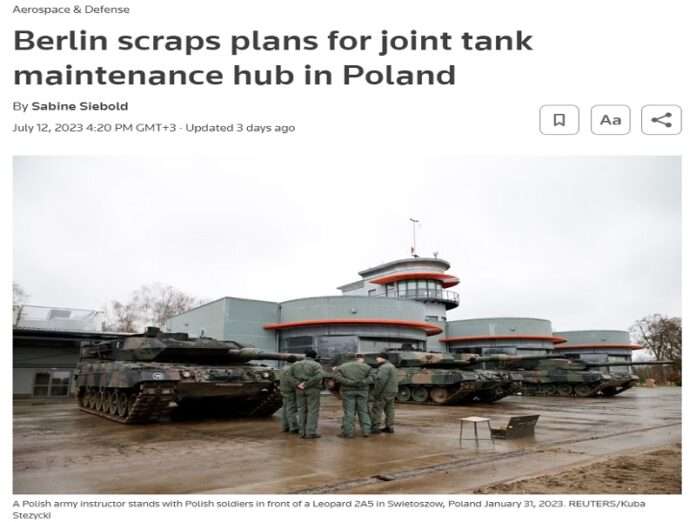A German Defense Ministry spokesperson announced on Wednesday that “Leopard 2A5 and Leopard 2A6 tanks will be repaired in Germany and likely in Lithuania” after talks with Poland over hosting a Ukrainian tank maintenance hub fell through. It was earlier observed that “There’s Plenty Riding On The Outcome Of The German-Polish Military Talks”, which is why it was expected that they’d find a compromise since these plans would have been mutually beneficial had they entered into fruition.
That didn’t happen, however, since Poland wasn’t negotiating in good faith. Instead of sincerely trying to reach a deal, it only wanted to fleece Germany by charging it exorbitant rates to repair Ukrainian tanks on its territory. In hindsight, the ruling “Law & Justice” (PiS) party might have thought that this could be a creative means for squeezing so-called “reparations” from Germany for World War II, or it could have wanted to doom the talks from the get-go in order to blame Berlin as part of its re-election campaign.
Regardless of whatever its true motivations were, the outcome of their talks collapsing is that Poland will now only be a transit state for these tanks’ repairs instead of hosting a hub like was originally intended. For the sake of either chasing a crazy profit margin for political reasons related to historical grievances or to rally Poles around the ruling party on an anti-German nationalist basis ahead of fall’s elections, these ambitious plans came to naught, which complicates Poland’s envisaged regional leadership plans.
Germany can now claim to be a more reliable long-term military partner for Ukraine, which helps reinforce its role as the US’ top NATO ally in the face of Poland’s challenge, while Lithuania will partially replace the role that Poland could have played in repairing Ukrainian tanks and thus boost its own regional role. About that, this tiny country has diplomatically punched far above its weight by provoking its American patrons’ Russian and Chinese rivals, and now it can add a military dimension to that too.
Not only will it soon repair some Ukrainian tanks, but it also plans to permanently host 4,000 German troops, which taken together will lead to it becoming the easternmost military outpost of the EU’s de facto leader. By making itself indispensable to Germany’s hegemonic ambitions, Lithuania can preemptively avert the scenario of becoming a Polish vassal as a result of its neighbor’s rise, plus it can attempt to play those two traditional rivals off against one another in pursuit of the best deals possible.
Without realizing it, PiS just hamstrung Poland’s envisaged regional leadership plans by practically precluding the possibility of Lithuania falling back under its influence and thenceforth resurrecting their long-lost commonwealth in a post-modern form. They’re still officially equal partners alongside Ukraine through their so-called “Lublin Triangle” framework, but it’ll be much more difficult than before for Warsaw to present itself as the “first among equals” now that Vilnius is so solidly backed by Berlin.
Finally infusing the aforesaid framework with a semblance of equality after it hitherto only had the superficial pretense thereof will further decelerate Poland’s hegemonic plans to the benefit of Germany’s. It can therefore be concluded that PiS’ unsuccessful attempt at fleecing its western neighbor had unexpected consequences by enabling Lithuania to more confidently balance Poland’s rise, which undermines the eastern dimension of the ruling party’s foreign policy ahead of this fall’s elections.







